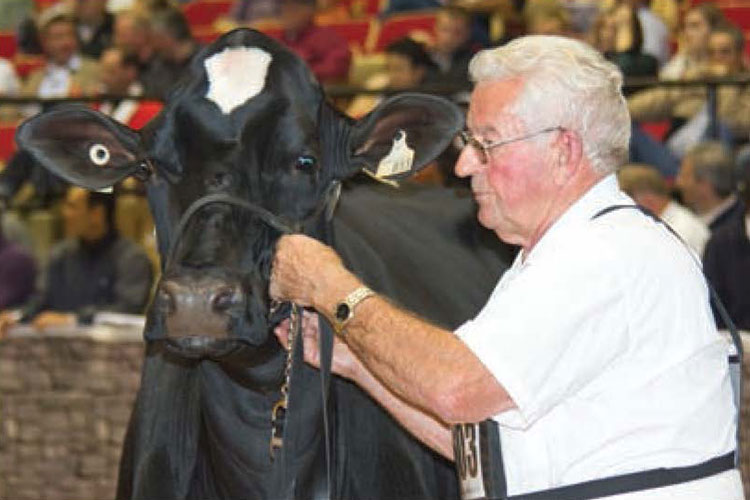 In the first decade following graduation from college, you spent four years selling feed and fertilizer, then worked for Canada's Holstein Journal handling both advertising and editorial duties, and then spent four years as farm manager at the famed Agro Acres. What did you learn at these early jobs?
In the first decade following graduation from college, you spent four years selling feed and fertilizer, then worked for Canada's Holstein Journal handling both advertising and editorial duties, and then spent four years as farm manager at the famed Agro Acres. What did you learn at these early jobs? When I graduated from college, Canada Packers hired me to collect unpaid bills in different areas where feed dealers were in financial trouble. I don't know why, but I had good luck getting money collected from farmers.
Based on that success, they gave me a territory in Bruce County so my wife and I moved to Walkerton, Ontario. The area wasn't blessed with a lot of dairy cattle or support industries. As a result, I became very involved in trying to educate dairy producers on feeding more protein, making hay earlier, along with other improvements. During that job, I got an opportunity to help some breeders prepare and show their cows. I had pretty good luck, but I didn't want to make it a career of it.
Then, an opportunity at the Holstein Journal opened up. Naturally, working for the Journal, I got to know just about everybody in the Holstein business. I really liked the job. However, the Journal was located in downtown Toronto, and commuting in and out of work every day (before the Gardiner Expressway was built) was a challenge. Dealing with all those traffic jams wasn't my cup of tea.
At the same time, Agro Acres started asking me to come and help them develop a herd of cows, and Angelo Agro convinced me to work for them. That was probably my biggest break because I was lucky that the cows I bought for Agro Acres turned out pretty good. We sold some cows and made some money. Mr. Agro liked the way things were going under my leadership and things went very, very good for a time.
However, there was some outside interference. For example, even though I was supposed to be in charge, people would tell Angelo that he shouldn't show under a certain judge and other things of that nature.
I said to him, "Angelo, you didn't hire me for that reason. If you are going to make the decisions where we show, I won't be able to work for you." He didn't think I would leave. But I left because the situation didn't improve.
Then, about seven months later, things weren't going good for them. Angelo started phoning me, and I eventually went back to do some consulting work. The new arrangement was the best thing that ever happened to me . . . I was probably more involved not being an employee than when I was working 16 to 17 hours a day. Angelo was like a second father to me. I worked with Mr. Agro until the end, and I was very much involved in selling the herd to Dreamstreet Holsteins.
After Agro Acres, you started your own cattle business in 1964. What did you enjoy about it?
I needed to make money. At that point of my life, I got an opportunity to buy commercial cows and sell them to different places in the United States.
During that time, I also helped Oak Ridges; I only worked for them when their cows went away from home. George Darrach wanted me to be responsible for the show cattle, and I ended up doing that for 13 years. During that era, the owner, Mr. R.R. Dennis, was hungry to have all the good cows in the country. Between George Darrach and myself, we were allowed to buy every good cow we could find.
While I was there, we had five different cows go on to be named Grand Champion at the Royal Winter Fair. We were also named Premier Exhibitor nine times (1964 to 1967 and 1972 to 1976). In addition, we won the Premier Breeder banner twice (1972 and 1974). That was tough to do in those days because Romandale, Pete Heffering, and Oak Ridges were major competitors. All three of those farms had substantial financial resources.









